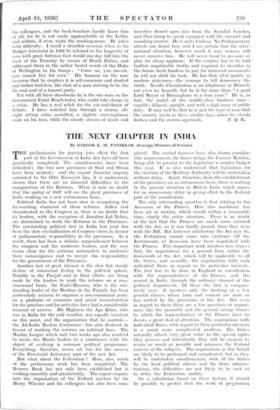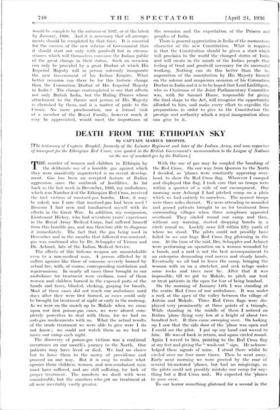THE NEXT CHAPTER IN INDIA
By SARDAR K. M. PANIKKAR (Foreign Minister of Patiala)
THE preliminaries for putting into effect the first part of the Government of India Act have all been practically completed. The constituencies have been delimited ; the two new provinces of Sind and Orissa have been created ;• and the expert financial enquiry entrusted to Sir Otto Niemeyer has, it is understood, shown that there are no financial difficulties to the inauguration of the Reforms. There is now no doubt that the spring of 1937 will see the great provinces of India working on a new autonomous basis.
Political India has not been slow in recognising the far-reaching character of these reforms. Sullen and discontented as the Congress is, there is no doubt that its leaders, with the exception of Jawahar La! Nehru, are determined to work the Reforms in the Provinces. The outstanding political fact in India last year has been the slow crystallisation of Congress views in favour of parliamentary responsibility in the provinces. As a result, there has been a definite rapprochement between the congress and the moderate leaders, and the way seems clear for the extreme nationalists to moderate their intransigeance and to accept the responsibility for the government of the Provinces.
Another fact of great interest is the slow but steady decline of communal feeling in the political sphere. Notably in the Punjab and in Sind efforts are being made by the leaders to work the reforms on a non- communal basis. Sir Fazl-i-Hussain, who is the out- standing leader of the Muslims in the Punjab, has been particularly anxious to organise a non-communal party on a platform of economic and social reconstruction for the province and his activities have had a considerable measure of success. His Highness the Aga Khan, who was in India for the cold weather, was equally insistent on this point, and the organisation that he controls— the All-India Moslem Conference—has also declared in favour of working the reforms on national lines. The Muslim League which met two weeks ago also resolved to invite the Hindu leaders to a conference with the object of evolving a common political programme. Everything, therefore, seems set fair for the success of the Provincial Autonomy part of the new Act.
But what about the Federation ? Here, also, much of the preliminary work has been completed. The Reserve Bank has. not only been ektablished but is working smoothly and satisfactorily. The expert enquiry into the organisation . of the Federal services by Sir Henry Wheeler and his colleagues has also been corn- pletcd. The central finances have also shown consider- able improvement., Sir James Grigg, the Finance Member, being able to present to the legislature a surplus budget this year. It is also understood that legislation for the creation of the Railway Authority will be undertaken without delay. Apart, therefore, from the establishment of the provinces on an autonomous basis, there is nothing in the present situation in British India which argues for an unnecessary delay in giving effect to the Federal part of the constitution.
The only outstanding question is that relating to the Accession of the Princes. Here also machinery has been set in motion, which would within a reasonable time, clarify the entire situation. There is no doubt of the fact that the Princes are much more satisfied with the Act, as it was finally passed, than they were with the Bill. But however satisfactory the Act may be, the Federation cannot come into existence till the Instruments of Accession have been negotiated with the Princes. This important work involves two stages ; first, the negotiations for a general form within the framework of the Act, which will be applicable to all the States, and secondly, the negotiations with each individual State in regard to its particular interests. The first has to be done in England in consultation with the representatives of the Princes, and the second in India, through the ordinary channel of the political department. Of these the first is compara- tively easy. It involves only the drafting of a few general clauses whose form and content are more or less settled by the provisions of the Act. But even in regard to them there arc a few questions of import- ance, like the preamble and the general saving clauses to which the representatives of the Princes have to devote a great deal of attention. The negotiations with individual States with regard to their particular interests is a much more complicated problem. The States naturally attach very great value to the special rights they possess and individually they will be anxious to retain as much as possible and minimise the Federal content of the subjects. The negotiations in this behalf arc likely to be prolonged and complicated, but as they will be undertaken simultaneously with all the States by the local political officers and the State adminis- trations, the difficulties are not likely to be such as to delay the Federation unduly.
On a calculation based on these factors, it should be possible to predict that the work of preparation would be complete by the autumn of 1937, or at the latest by January, 1938. And it is necessary that all arrange- ments should be completed by that time. It is essential for the success of the new scheme of Government that it should start not only with goodwill but in circum- stances which will themselves convince the Indian public of the great change in their status. Such an occasion can only be provided by a great Durbar at which His Imperial Majesty will in person solemnly inaugurate the new Government of his Indian Empire. What better occasion can there be for this historic change than the Coronation Durbar of His Imperial Majesty in India ? The change contemplated is one that affects not only British India, but the Ruling Princes whose attachment to the throne and person of His Majesty is cherished by them, and is a matter of pride to the Crown. No mere proclamation, nor a formal visit of a member of the Royal Family, however much it may be appreciated, would meet the importance of the occasion and the expectation of the Princes and peoples of India.
There is general appreciation in India of the momentous character of the new Constitution. What is reqUired is that the Constitution should be given a start which will proclaim to the world the changed status of India and will create in the minds of the Indian people that feeling of trust and goodwill necessary for its Successful working. Nothing can do this better than the in- auguration of the constitution by His Majesty himself on the solemn and auspicious occasion of his Coronation Durbar in India and it is to be hoped that Lord Linlithgow, who as Chairman of the Joint Parliamentary Committee was, with Sir Samuel Hoare, responsible for giving the final shape to the Act, will recognise the opportunity afforded to him, and make every effort to expedite the preparations in order to give to the Constitution the prestige and authority which a royal inauguration alone can give to it.



















































 Previous page
Previous page